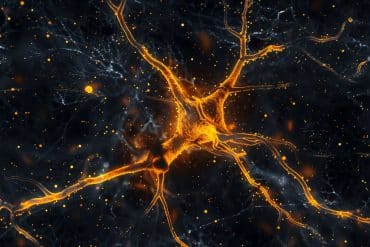Summary: A midday nap after a learning session helped infants associated correct or incorrect words to new objects they had been exposed to. The study sheds light on the role sleep plays in developing lexical memory.
Source: Max Planck Institute for Human Cognitive and Brain Sciences (MPI CBS).
Babies succeed much earlier than previously assumed in assigning meanings to words and to not perceive them as random noise.
While babies sleep, astonishing processes take place in their brains. Scientists at the Max Planck Institute for Human Cognitive and Brain Sciences (MPI CBS) in Leipzig observed that babies succeed in associating a meaning with a word between the age of six and eight months — a capability which until now was known for older children and adults. Memory which is assigned to the meaning of words passes through the same stages during sleep that also happen in typical lexical development: So-called protowords which combine only simultaneously occurring visual and acoustic stimuli become real words that are connected to content.
The scientists investigated these relations by introducing six- to eight-month-old infants to fantasy objects which they gave fantasy names such as “Bofel” or “Zuser”. Objects that differed only in form or colour were called the same names — just as cats are called “cats” although they differ in their details. The researchers chose these fictitious objects to make sure that the young study participants could not access any existing knowledge.
From the infants’ brain reaction it was clear that the children could not connect new objects of the same category with the corresponding name. That means they did not recognise a new Bofel as a “Bofel” although it was quite similar to the previously seen Bofel versions. For the babies, every new object-word pair was unknown and unique, they could not yet build a general relation between them.
This changed after a midday nap. In babies who fell asleep after the learning phases, the brain could differentiate between the right and wrong term for a new object. They had consolidated their knowledge while sleeping. Babies that stayed awake could not manage to do so.
Interestingly, the children developed two different types of knowledge depending on the duration of sleep. After a half-hour nap they showed a brain reaction which three-month-olds already have after associating a visual stimulus with an acoustic one. During their nap they filtered similar features out of the objects and connected them with the sound of a word. Similar to the three-month-old babies, they perceived the word as a random sound with no meaning.
Unlike the infants who napped for half an hour, babies that slept for about 50 minutes showed a brain reaction that was previously only known for older children and adults. Here, the so-called N400 component occurred, which signals that incongruous meanings were processed in the brain–whether it be in sentences, word pairs, picture stories or object-word pairs. By means of this component the researchers were able to recognise that the young participants in fact learnt the meaning of the words.

“Our results demonstrate that children hold real word meanings in their long-term memory much earlier than assumed. Although the brain structures relevant for this type of memory are not fully matured, they can already be used to a distinguishable extent”, explains Angela D. Friederici, director at MPI CBS and senior author of the underlying study which has recently been published in Current Biology.
In this context, one stage of sleep could be of particular importance: The duration of the second of the four stages of sleep, in particular, seems to have an important influence on the development of lexical memory. “During this light sleep, the transition from a simple early developing form of lexical memory to an advanced later developing form evidently takes place”, says study leader Manuela Friedrich. “These two types of memory which develop during sleep are comparable with those that we know from infant development. Whereas during sleep there are just minutes in between the two types, in typical development there are months.” The formation of memory content in sleep clearly takes place in fast motion.
“In our study, however, the babies received such a lot of information which they normally pick up within a longer time period”, Manuela Friedrich adds. “But only during sleep, when the child’s brain is disconnected from the outer world, can it filter and save essential relations. Only during the interaction between awake exploration and ordering processes while sleeping can early cognitive and linguistic capabilities develop properly.”
Source: Verena Müller – Max Planck Institute for Human Cognitive and Brain Sciences (MPI CBS)
Image Source: NeuroscienceNews.com image is credited to MPI CBS.
Original Source: Abstract for “The Sleeping Infant Brain Anticipates Development” by Manuela Friedrich, Ines Wilhelm, Matthias Mölle, Jan Born, and Angela D. Friederici in Current Biology. Published online June 27 2017 doi:10.1016/j.cub.2017.06.070
[cbtabs][cbtab title=”MLA”]Max Planck Institute for Human Cognitive and Brain Sciences (MPI CBS) “Sleep Makes it Possible for Babies to Associate Words With Content, and Not With Noise.” NeuroscienceNews. NeuroscienceNews, 8 August 2017.
<sleep-baby-words-content-7265/>.[/cbtab][cbtab title=”APA”]Max Planck Institute for Human Cognitive and Brain Sciences (MPI CBS) (2017, August 8). Sleep Makes it Possible for Babies to Associate Words With Content, and Not With Noise. NeuroscienceNew. Retrieved August 8, 2017 from sleep-baby-words-content-7265/[/cbtab][cbtab title=”Chicago”]Max Planck Institute for Human Cognitive and Brain Sciences (MPI CBS) “Sleep Makes it Possible for Babies to Associate Words With Content, and Not With Noise.” sleep-baby-words-content-7265/ (accessed August 8, 2017).[/cbtab][/cbtabs]
Abstract
The Sleeping Infant Brain Anticipates Development
Highlights
•Memory consolidation during infant sleep parallels early stages of lexical development
•The duration of sleep stage 2 determines the developmental stage of new infant memories
•Local sleep spindles in N2 are involved in the formation of lexical-semantic LTM
•Sleep-dependent memory consolidation precedes the normal course of development
Summary
From the age of 3 months, infants learn relations between objects and co-occurring words. These very first representations of object-word pairings in infant memory are considered as non-symbolic proto-words comprising specific visual-auditory associations that can already be formed in the first months of life. Genuine words that refer to semantic long-term memory have not been evidenced prior to 9 months of age. Sleep is known to facilitate the reorganization of memories, but its impact on the perceptual-to-semantic trend in early development is unknown. Here we explored the formation of word meanings in 6- to 8-month-old infants and its reorganization during the course of sleep. Infants were exposed to new words as labels for new object categories. In the memory test about an hour later, generalization to novel category exemplars was tested. In infants who took a short nap during the retention period, a brain response of 3-month-olds was observed, indicating generalizations based on early developing perceptual-associative memory. In those infants who napped longer, a semantic priming effect usually found later in development revealed the formation of genuine words. The perceptual-to-semantic shift in memory was related to the duration of sleep stage 2 and to locally increased sleep spindle activity. The finding that, after the massed presentation of several labeled category exemplars, sleep enabled even 6-month-olds to create semantic long-term memory clearly challenges the notion that immature brain structures are responsible for the typically slower lexical development.
“The Sleeping Infant Brain Anticipates Development” by Manuela Friedrich, Ines Wilhelm, Matthias Mölle, Jan Born, and Angela D. Friederici in Current Biology. Published online June 27 2017 doi:10.1016/j.cub.2017.06.070






